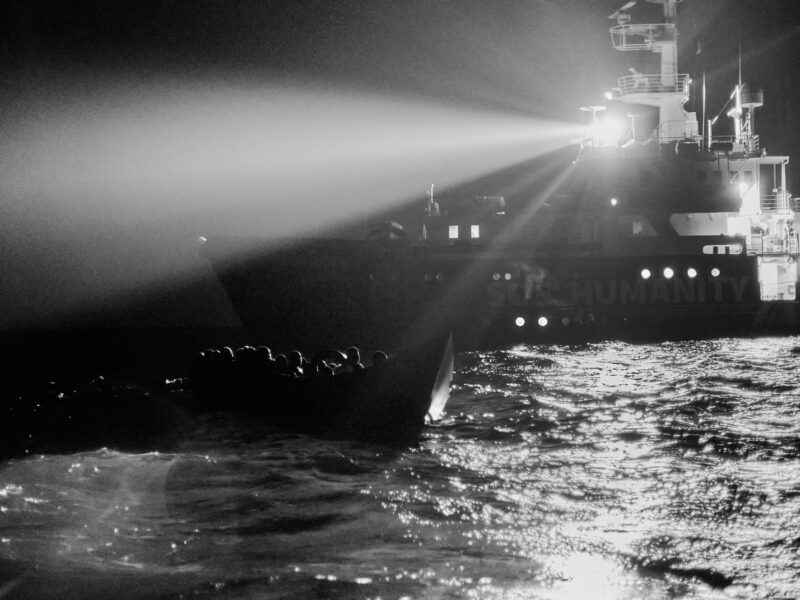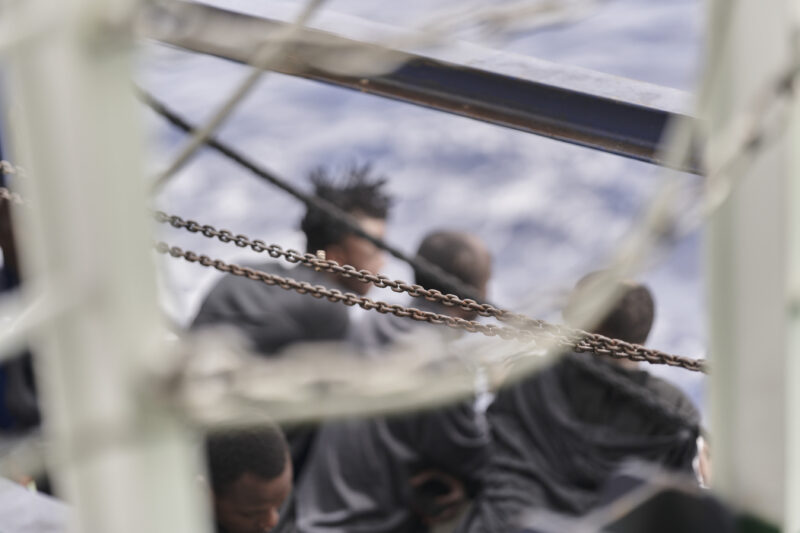“The man I was working for was a racist”: Romeo on his time in Tunisia and his flight across the Mediterranean

Romeo* comes from the Ivory Coast and fled from Tunisia across the central Mediterranean in the summer of 2023. On board, he tells his flight story and reports on the inhumane living conditions to which he was exposed.
Trigger warning: The following text contains explicit depictions of violence, physical violence, racist violence, death, war, racism
*To protect the person, the name has been changed and he is not shown in the photos

I come from the Ivory Coast. I lost my parents during the war. My mother and father were running away from the war. They were going to shoot my father, he went into shock, he knew he was going to die. I had no one to help me, I had to fend for myself. So, I left the Ivory Coast, on foot.
When I arrived in Mali, I met a man with a car who offered to take me to Morocco. When I gave him the money, we got in the car and he took me as far as Bamako, Mali, where he dropped me off. He couldn’t continue. I had to continue on foot, all the way to Libya. I worked until I got some money. Then I kept on walking. I said to my friends: “We can make it, we can make it to Europe!”
I spent another two weeks on the road until I arrived in Tunisia. The man who called me, who brought me to Tunisia, he sold me like a slave. I worked under very difficult and harsh conditions. The man I was working for was a racist. I didn’t have a problem with the Tunisians until I met this man.

One day, I was very ill, I said: “I can’t go to work”. They took an iron bar and hit me. Someone hit me and it tore my skin here [indicates scars on arms]. He hit me again. I had to protect my face because otherwise it would have destroyed my eyes. And I’m not going to show you everything, either, because I’ve lost a lot of things. One of my testicles is ruptured. You see, that’s what he did. One’s broken, only one’s left. I often feel pain.
I don’t know the name of the town I was in because I didn’t go out. He kept me in the house. I wasn’t allowed to go out. They didn’t pay me.
He told me, if I would talk, he would take me to the police because we Blacks have no rights there. It’s not far from Sfax where the police camp is. But I don’t know the exact name.
I had come all that way – I couldn’t go on.
He beat me, the skin was torn. I had to run away. After two years, I had no more money. I had to run away, to find paid work. I worked on the building sites there. I worked, I slept, that’s it. I was able to keep my money. I had to work to get out of there.
We weren’t forced onto the boat, it’s just that we didn’t have a choice. Living in Tunisia at the moment, it’s terrible, it’s very, very, very hard for us. So, we had to run away.
Waiting for an opportunity to escape
The boat was small. We spent one day on the boat. Maybe we could have lasted for two days, but if it wasn’t for you, eventually death would have come for us.
Before we set off, we spent five days in the bush without eating or washing. It wasn’t our choice: the man who arranged the journey said: “If we can launch you the next day, in the evening, we’ll take you”, but when he dropped us off, the weather was bad. To make the journey, we had to wait there for five days beforehand.

We set sail at ten o’clock. It was an iron boat. There was very little room. The engine gave out on us. The weather was getting bad. The sea was taking a turn for the worse, the waves were too high. We were in a panic and started crying. There were thirty-nine of us. There were two children on board, and a pregnant woman.
I thought it was all over for me. That’s what I told myself. It was at the last minute, maybe at nine p.m., when you arrived, the sky was leaden.
But thanks to the glory of God, you came to save us. What we went through was terrible. I thank the name of the Lord, because I’m alive, I’m here talking to you. If it wasn’t for you today, it’s true, we wouldn’t be here talking. If I thank God, I’m obliged to thank you too.
I prayed before, when I was in Tunisia, but my boss stopped me. Because they’re Muslims, and I’m a Christian. That I escaped at the last moment, was a miracle from God.
First aid on board
When I arrived on board, I came here, to the clinic, twice, because everything hurt. Now I feel pain when I want to sleep, it’s hard. We couldn’t move on the boat.
I had a girlfriend in Tunisia, my only family. My girlfriend is here on board, too, we came together. She’s on the ship now. But when I spoke to her about telling her life story, she didn’t want to. She said: “How can I explain my story?”
In Europe, I hope for asylum protection. I want to be safe, that’s my wish. Because I don’t have anyone looking out for me. That’s all I want.
This interview was carried out in French, recorded and translated by Sasha Ockenden, SOS Humanity’s Communications Coordinator on board Humanity 1.


